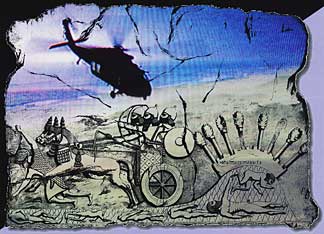Society for the Humanities explores 'Culture and Conflict'
By Dan Aloi

Cornell's Society for the Humanities will focus on "Culture and Conflict" during 2005-06, with visiting and Cornell faculty offering seminars directly related to the theme.
"Violence in our contemporary world, with its massively accelerated contact between formerly remote groups and peoples, is often justified by a notion of insurmountable cultural differences," said Brett de Bary, director of the society and a professor of Asian studies and comparative literature at Cornell. "We need to critically analyze this assumption, especially in the face of a so-called war on terror that is being defined on a global scale."
Society fellows will bring their expertise in philosophy, history, literature and the arts to this analysis, with courses approaching culture and conflict from a broad range of perspectives. De Bary said she hopes that the focal theme will be a catalyst for discussion around campus. Each of the four-credit courses is limited to 15 students each.
Fall semester courses include Lynching Violence in America (SHUM 413), with visiting fellow Natasha Barnes, a professor of African-American studies and English at the University of Illinois-Chicago. The course will examine the history and representation of racial violence in the post-bellum South. Her co-instructor will be James Allen, curator of a historic traveling exhibit of postcard photography of lynchings, "Without Sanctuary," later published as a book.
Michelle Campos, an assistant professor of modern Middle Eastern history specializing in the late Ottoman Empire, will consider Ethnic and Religious Conflict (SHUM 412) in Lebanon, Israel/Palestine and Turkey.
Michael Shin, assistant professor of Asian studies and a scholar of modern Korean and Japanese intellectuals, will examine Fascism, Literature and Culture (SHUM 411) in Germany, Italy and Japan.
Two fall courses will approach culture and conflict primarily through literary texts. In Literature of Revolution (SHUM 404), Walter Cohen, professor of comparative literature, will examine literary responses to popular revolutions, including writings by John Milton, Honoré de Balzac, Herman Melville and Vladimir Nabokov.
Romance studies professor Richard Klein will look at the rise of troubadour poetry in Provençal, against the backdrop of the genocidal violence of France's 13th-century Albigensian Crusade, in the course Troubadours and Heretics (SHUM 408).
On Sept. 13, the society will co-sponsor a symposium on civil wars, in collaboration with the recently opened Institute for the Social Sciences at Cornell. The guest speaker will be David Laitin, the Watkins Professor of Political Science at Stanford University and director of the Center for the Study of Politics, History and Culture at the University of Chicago from 1987 to 1998.
Humanities courses offered in the spring will include: Science and Democracy, Towards a Prehistory of Terrorism, Religion, Conflict and Media; Rastafari, Race and Resistance; Neoliberalism and Culture; The Literature of Imperialism; and several others.
The society awards fellowships annually for research in the humanities, in addition to overseeing a group of Mellon graduate and postdoctoral humanities fellows. In line with their research, society fellows offer informal exploratory or interdisciplinary seminars, which are open to graduate students, qualified undergraduates and interested auditors. Students can arrange to receive credit for a seminar, and nonenrolled visitors can attend with the fellow's permission.
The 16 society fellows this year also include Cornell faculty members Oren Falk, history; Steven Pond, music; and Jeffrey Rusten, classical studies.
In addition to Barnes and Allen, visiting fellows for 2005-06 include art historian Petrine Archer-Shaw, Peter Bojanic of the Institute for Philosophy and Social Theory, Belgrade; private researcher Stefano Jedrkiewicz; Andrew Jewett, University of California-Berkeley; Nae-hui Kang, Chung-Ang University; Dorothea Schulz, Indiana University; and Baki Tezcan, University of California-Davis.
Media Contact
Get Cornell news delivered right to your inbox.
Subscribe